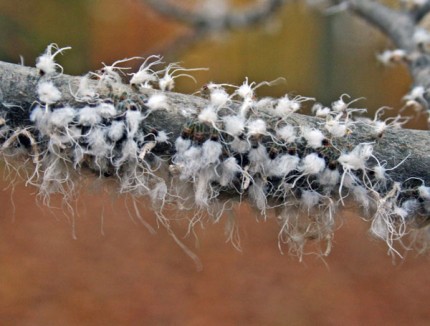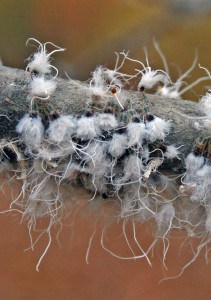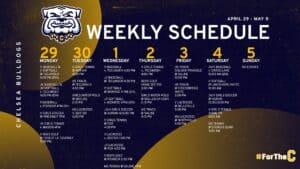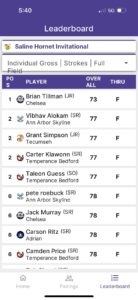
(Chelsea Update would like to thank Tom Hodgson and the Waterloo Natural History Association for the information and photos in this story.)
While walking through the beech woods on the way to the bog at the Discovery Center this week, one is likely to encounter some dancing bugs, “Boogie Woogie” bugs to be exact.
Some of the lower branches on the American beech trees may seem to be white with snow.
And the snow is moving. It’s moving because the “snow” is actually made up of living insects called wooly aphids.
This species, also called the beech blight aphid, is only found on American beech trees. There may be hundreds or even thousands on a single branch. When disturbed, they all begin wiggling and swaying their behinds as if keeping time with some unheard music, hence the nick name “boogie woogie bugs.”

Although no one knows for sure why they wiggle, this behavior may be some sort of a defense mechanism. Their bodies are covered with long white, waxy filaments giving them a wooly appearance and making them look less like insects.
Aphids have long snouts called proboscides that enable them to draw sap from the tree’s leaves and branches. They extract the nutrients from the sap and then expel drops of a sugary, liquid called honey dew.
There are many kinds of aphids that live on a variety of host plants including trees, flowers and shrubs. Some can be harmful to their hosts, but this species does little harm to the beech trees. Ants are so attracted to the sugary liquid, they will sometimes watch over aphids like a farmer protecting a herd of prized milk cows.
In years when nectar from flowers is scarce, honey bees will collect honey dew from the aphids and turn it into real honey, though not of the best quality.
The boogie woogie bugs produce so much honey dew that it drips onto the ground where it provides food for a dark, sooty mold that stains the soil and any fallen objects. Honey dew dripping from an infested tree whose branches spread above a house can temporarily stain the shingles on the roof.
A car parked under an infested tree will soon be covered with sticky honey dew.
For those who would like to take a virtual walk to see these boogie woogie bugs, click on this link and enjoy the show. Near the end of the video the camera pans to the ground where the sooty mold is visible as well. It’s time to boogie.












